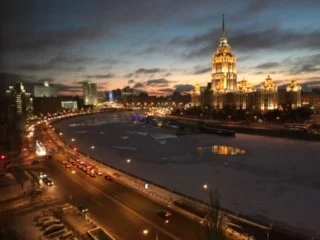There is no doubt about the tense relations between EU and Russia and even more between NATO and Russia. There are many reasons for the deterioration of the respective relations. Unfortunately; the possible peace and cooperation dividend after the collapse of the Eastern Block and the Soviet Union has not been consumed. Too much has it been seen outside Russia as a victory of the "West", it's values, its economic system and its military force. Francis Fukuyama expressed it most clearly: we arrived at "The End of History". Even in Russia many agreed with that interpretation of history. But things developed differently.
Russia in a New World Order? Lessons from the "Primakov Readings"
Invited to a conference in Moscow called "Primakov Readings" organized by the Russian Think Tank IMEMO, I had the opprtunity to listen to numerous speakers from Russia but also from countries stretching from Japan, China and India via Europe to the US. The meeting was held in honour of a former Russian foreign minister who was one of the architects of the new foreign policy of Russia after the breakdown of the Soviet Union. He combined an attitude of international cooperation and of a strong representation of Russian interests in its immediate neighborhood but also globally. He became famous when, on the way to the US, invited by Vice-president Al Gore, he ordered the plane to return to Moscow after he was informed that the US and its allies would start bombing Serbia. This decision is used today for making clear, that Russia cannot and will not accept unilateral decisions and the global dominance by the US.
Peace, Stability and Confidence through Economic Connectivity The case of the Western Balkan
Connectivity is a very wide term which covers several kinds of - economic - connections. They may be bilateral, concern a region with similar characteristics, the connection to other regions important for the economic development and even global connections. Very often this connectivity is overlapping and can be of mutual support. And this can be found in the Western Balkans.
The Middle East: Revitalized Fault Lines and Conflicts
The Mediterranean Sea was over many centuries characterized by movements of people and goods across the national borders of countries and across the sea. Some migratory movements were peaceful and contributed to trade and economic development. But many refugee flows were and are caused by conflicts, wars and occupations. Refugees tried to reach neighbouring countries like the vast majority of Palestinians or the "North" as especially today with many refugees from Syria and Iraq. The moving divisions and fault lines across the Mediterranean Sea and the different countries bordering that sea created again and again turmoil and chaos. But there were also periods of stability and peace.
Is Mass Migration from Africa Endangering Peace and Stability in Europe?
In the last two and half years I visited professionally three sub-Saharan countries, besides a brief visit to South Africa: Ghana, Tanzania and Uganda and now again privately Tanzania. In spite of the private character of this last visit I had time and interest to consider the special challenges for African countries, most of them also challenges for Europe. And as with the Middle East - maybe more indirectly - peace and stability in Africa is helping to maintain peace and stability in Europe.
Peace In the Middle East
Peace in Europe depends strongly on war and peace in the Middle East. This has never been more clear and visible than after the terrorist attacks in Paris this November. Irrespective and independently from the recent refugee stream from Iraq and Syria we have to recognize the new level of interdependence. The links with the regions "south" of the Mediterranean Sea became so strong that a separation via new borders and walls is impossible. Such demands of the populists are leading nowhere.
Terror and Europe's Reaction
40 Years after Helsinki: How to Continue
The S&D group in the European Parliament organized recently a conference on "Helsinki 40 years after" - after the Helsinki conference of 1975. EU and Russian representatives and experts had an open exchange about the way or better ways forward. Helsinki was a big success and had its contribution to overcome the division of Europe. But now we have new conflicts between Russia and the EU and we saw some sort of a new Cold War. In the following are my basic thoughts I could present to the conference in a round table with Karsten Voigt from Germany and Andrej Gromyko from Russia as well as one colleague from Finland and one from Georgia.
How are the Balkans?
Hannes Swoboda on the actual situation of the Balkans in the context of an expert workshop which was followed by a public debate in Vienna organised by the Ustinov Institute, the OIIP (Austrian Institute for International Affairs), the IIP, the BMI (Boltzmann Institute for Human Rights), the Renner Institute and the Institute for Danube Region and Central Europe.
Europe and its Contribution to European and Global Security
The Cuban "Centro de Investigacion sober Politica Internacional" (which is attached to a small University which is itself in close contact to the Cuban foreign ministry) has recently organized an international conference in Havana. The subject was the "geopolitical transformation between cooperation and conflict". Peter Stania and myself representing the Vienna International Institute for Peace (IIP) were invited to actively participate. I was given the task to speak primarily on the role of Europe and specifically of Central Europe in that context. In the following you find a summary of my talk. A more extensive report on my visits to Mexico and Cuba will follow in due time.




